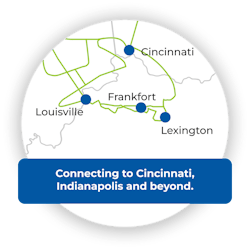Great Plains Communications lights up Kentucky’s commercial market
Key Highlights
- GPC Fiber’s 165-mile network connects key Kentucky markets, including Louisville and Lexington, to GPC’s extensive 19,000+ mile backbone, supporting enterprise and hyperscale needs.
- The deployment features Ciena’s WaveLogic 5 Nano technology, enabling 400G data center interconnects and enhanced network resiliency through segmented routing and Layer 2 VPNs.
- Expansion was driven by customer demand, particularly from fiber-to-the-tower clients, and aims to support diverse industries such as logistics, manufacturing, biotech, and food & beverage.
- GPC’s services include high-speed internet, unified communications, managed Wi-Fi, SD-WAN, private wavelengths, dark fiber, and cybersecurity solutions, catering to a wide range of customer sizes.
- The Kentucky market offers significant growth opportunities, with strong economic activity in Louisville and Lexington, driven by major industries and regional infrastructure, making it a strategic expansion for GPC.
Great Plains Communications (GPC) is taking on Kentucky’s business and wholesale market as part of an ongoing strategy to expand its business services reach into growing markets.
At the heart of this new expansion effort is a new 165-mile fiber network that it says will provide businesses, wholesale customers, wireless carriers and hyperscalers with fully redundant fiber connectivity and a suite of enterprise-grade services with speeds ranging from 1 Gigabit to 400 Gbps.
Operating under the brand “GPC Fiber, by Great Plains Communications,” the network build will deliver fiber connectivity directly to key Kentucky markets, including Louisville, Lexington, Frankfort, Jeffersontown, Simpsonville, Shelbyville, Bridgeport, Georgetown and Versailles.
Serving a mix of data center providers, small businesses, large enterprises and wireless operators, GPC Fiber delivers dedicated fiber solutions with speeds from 10 Mbps to 400 Gbps and connections into its 19,000+ mile network.
“Businesses in Kentucky don’t identify themselves as being part of the Great Plains, they think of being part of the State of Kentucky,” said Chris Sikora, CRO of Great Plains Communications. “For them to concentrate on our services as opposed to some regional aspect, we decided in Kentucky we’ll operate as GPC Fiber.”
Raising capacity, resiliency
The expansion into Kentucky comes as GPC continues to enhance its network and increase capacity. Part of this process included deploying Ciena's Coherent Routing solution and WaveLogic 5 Nano (WL5n) technology.
With its ongoing upgrade process, GPC is set on fulfilling various key applications: wireless backhaul with 10G capability and 400G data center interconnection to support 400G Data Center Interconnect (DCI) services to large cloud and data center operators. Also, the Ciena equipment enables greater resiliency of Layer 2 VPNs with Segment Routing for protecting packet services.
“We’re continuing to increase our network with expansion and adding more technology,” said Tony Thakur, CTO of Great Plains Communications (GPC). “We introduced segmented routing capabilities and added 400G capability for a few customers, so we’re continuing to upgrade and add new capabilities for our customers.”
Customer drivers
When GPC considered creating an entry into the Kentucky market, which was outside of its 13-state footprint, GPC was driven by a customer demand.
In this case, there was a request from one of its fiber-to-the-tower (FTTT) customers for capacity.
“The original impetus from a large fiber-to-the-tower (FTTT) customer that needed connectivity to key sites,” said Chris Sikora, chief revenue officer for Great Plains Communications.
But as it considered its FTTT customers’ needs, it saw that Kentucky could be a fruitful target to deliver business services. “You can see the economic activity within Kentucky, whether it’s the logistics business, manufacturing and even the hyperscalers and even small businesses,” Sikora said. “Also, we like to build and operate our own fiber networks because we believe that’s the best way to bring service to our customers.”
Regardless of the customer size, Sikora emphasized that it treats every customer equally. “By bringing physical fiber diversity to businesses, we strengthen their network and that does not matter if you are a coffee shop or a manufacturer of batteries for electric vehicles,” he said. “As we bring more competition to the market, it increases innovation and provides better answers for these customers.”
Hyperscaler market rising
With a 13-state network footprint in place, GPC will continue to pursue new hyperscale data center opportunities in its existing markets as well as the new Kentucky market.
Sikora said the new network footprint positions the provider to address existing and new data center builds.
“Across our entire network footprint, these hyperscalers have existing data centers that are already there and they are actively constructing others,” he said. “These hyperscalers have got deep connectivity needs that we’re prepared to answer.”
As GPC pursues hyperscaler opportunities, the service provider is keen to bring services to nearby businesses in Kentucky’s Louisville to Lexington corridor—two markets that are seeing ongoing business growth.
Driven by a mixture of capital investments and job creation in 2023, the Louisville business market is experiencing strong economic growth, with projected continued expansion in 2025. Key strengths include its strategic location, major industries like logistics (UPS), advanced manufacturing (Ford, GE Appliances), and a thriving food and beverage sector.
Likewise, Lexington, Kentucky’s location has made it a prime spot for a diverse business market. It also includes strong education systems (particularly the University of Kentucky), and established industries like automotive/manufacturing (Toyota), biotech/life sciences, logistics/distribution, and food/beverage processing.
“The Louisville to Lexington corridor is anchored by metros on either side, and these robust small communities in between that have an small to medium business (SMB) need,” Sikora said. “We’re also attracting big manufacturers in some cases.”
Thakur agreed and added that there’s “a community of interest between Southern Indiana and Northern Kentucky, which feature large airports, so it makes good business sense for us to explore that market further.”
Diverse service sets
As it has done it its traditional footprint, GPC will serve a diverse range of customers in Kentucky.
This could range from a wireless operator taking high-speed optical circuits to an SMB customer taking internet access, voice services and managed Wi-Fi.
“When we design these networks, the fiber goes where the fiber goes,” Sikora said. “From our perspective, it makes sense to serve as many types of customers as we can along those fiber routes whether it’s a small business coffee shop, data center for a hospital, a hyperscaler or a fiber to the tower customer.”
Leveraging multi-gigabit optical equipment to ensure resiliency, the new Kentucky network will support a broad portfolio of services, including internet access, unified communications, managed Wi-Fi, managed firewall, SD-WAN, 5G backup, private wavelengths, dark fiber and custom-built networks.
Earlier this year, the service provider introduced new products, including a unified communications (UC) service and managed firewall and cybersecurity services.
As an an all-in-one hosted PBX and Unified Communications (UC) solution, GPC’s UC service includes voice, video conferencing, chat, SMS, contact center, file sharing, business email, multi-channel archiving, backup, security, along with integrated mobile and desktop apps that speak to the mobile nature of business customers.
Leveraging Fortinet FortiGate firewalls, GPC Managed Firewall services give small businesses a fully integrated solution, including internet, voice, SD-WAN and managed firewall all on one consolidated bill.
Thakur said it is seeing more demand for managed services across its 13-state footprint.
“There’s more demand for cloud-based services,” he said. “One of the sweet spots is multi-location type customers that have a headquarter site, a data center and branch locations. This allows us to connect their data center and locations with Ethernet or internet services and other services like SD-WAN and managed security.”
He added that “we’re also seeing demand for these services even outside of its footprint.”
Sikora agreed and added that “having application-aware routing enables us to provide businesses the best performance out of those locations and handle that for the customer so they can focus on their core business focus.”
For related articles, visit the Business Topic Center.
For more information on high-speed transmission systems and suppliers, visit the Lightwave Buyer’s Guide.
To stay abreast of fiber network deployments, subscribe to Lightwave’s Service Providers and Datacom/Data Center newsletters.
About the Author
Sean Buckley
Sean is responsible for establishing and executing the editorial strategy of Lightwave across its website, email newsletters, events, and other information products.




